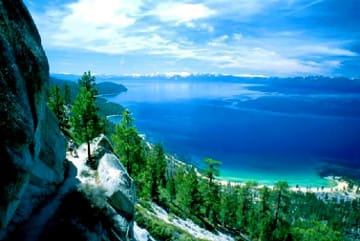Save Lake Tahoe bill sponsored by California and Nevada Senators


All four Senators from California and Nevada, one Republican and three Democrats, are jointly sponsoring the Lake Tahoe Restoration Act of 2010. A new report by UC Davis scientists using 100 years of data and computer models of the future shows why immediate action is needed. They are projecting a bleak future for Lake Tahoe as the effects of climate change damage the lake. Among the potential impacts of climate change by 2100 are:
Less snow and more rain. Water will get released faster with less available in the late spring and summer, because water that used to come later in the year from snow melt will no longer exist.
Greatly increased flows in the Truckee River with potential for flooding as well as bridge and road erosion. 1000 year floods will become 100 year floods. But there will also be times when the Truckee doesn't flow at all. This hugely impacts Reno, Pyramid Lake, and farms, which rely on water from Tahoe.
Droughts towards the end of the century, quite possibly decades-long. Imagine what that would do to Reno.
Less deep-mixing (top-to-bottom water circulation) in Lake Tahoe due to rising temperatures. This means less oxygen in the bottom of the lake which in turn means less fish and cloudier water. Worse, phosphorous in the sediment could then start rising to the top where it will create algae. But the lake already has a problem with this. Lack of circulation and increased algae could result in a nearly dead lake.
Among other steps, they recommend removal of fine particles going into Tahoe. This will cut down on phosphorous and keep the lake healthier. Without it, water quality will suffer.
Sen. Dianne Feinstein (D-CA) says The Lake Tahoe Restoration Act of 2010:
"would authorize a broad array of programs to mount an aggressive attack on the many threats facing Lake Tahoe and the Tahoe basin, including invasive species, wildfires and pollution and sedimentation."
Among the projects would be stormwater management, watershed restorations, eradicating invasive species, and preventing wildfires, as the runoff from fires dumps ash into the lake, further hurting water quality.
Well heck, most of the problems in Tahoe won't hit until 2050 or even 2100, so why should we care? Let the next generation deal with it!
Unfortunately, that's been a primary attitude for far too long. One look at the current California budget train wreck shows that problems can't be dropkicked down the road forever. Sooner or later, the charade will be over and reality must then be dealt with. But solutions to budget problems that have been ignored for years do exist, however painful their implementation may be. But if Tahoe goes dry for years or the water quality is seriously degraded, there will be no solution. The areas that rely on the lake for water will simply cease to exist.
That's why we need action now. This joint proposal by the four Senators shows that bipartisan efforts involving two states is indeed possible - and essential, if we are to save Lake Tahoe.



